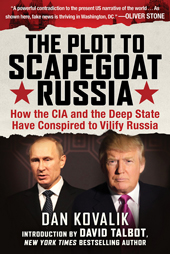
Another bad idea from The New York Times
By Phil Giraldi
Sometimes when you begin to think that things can’t get any worse, they suddenly do just that. A basic principle of politics among nations, often referred to as Diplomacy 101, is that you prioritize your interests so that you are not wasting your time and energy by pursuing objectives that are either essentially inconsequential or even meaningless at the expense of authentic vital national interests. Yet that is precisely what the United States has been doing since 9/11. At that time, the immediate threat to the United States was posed by an international terrorist group, which Washington had supported against the Russians only a few years before, that had found a home in Afghanistan and which was allegedly tied to the airplane hijackings in the United States.
The Afghan government was willing to give up Osama bin Laden and his supporters if Washington was able to demonstrate a link between al Qaeda and the 9/11 attack, but the George W. Bush administration was either unwilling or unable to do so, so it eschewed remaining diplomatic options that might have brought about a resolution and instead ordered that an invasion to remove bin Laden be mounted using both CIA recruited allies in the region and U.S. forces. The attack was made with the full support of the American people, the media, and Congress. The Taliban government, which was in charge of the country, predictably fell quickly, leaving Afghanistan in disarray, which has continued to this day. Ironically, bin Laden himself escaped when ground commander Gen. Tommy Franks refused to commit U.S. troops to block his escape route into Pakistan. It was an example of failure to prioritize interests. Capturing bin Laden would have severely damaged al Qaeda and de facto ended the conflict, but Franks, to avoid a risky operation using his own soldiers, made the wrong choice and “catch me if you can” with bin Laden continued for another 10 years.
Bad decision-making also afflicts the process whereby the United States, often seemingly obsessed with its “exceptionalism” and its presumed “leadership of the free world,” confuses what it can do with what it should be doing. Meanwhile, those bad instincts are often encouraged by a warmongering media. If one wants to witness ignorance of American diplomacy and news reporting at its worst, it is only necessary to journey through the strange world inhabited by the punditry at newspapers like The New York Times and Washington Post.
Bret Stephens, the self-proclaimed conservative voice at the Times, makes no attempt to conceal his hostility to nations like Russia, China, and Iran. His latest foray into the unknown is to advocate congressional legislation to punish Russian President Vladimir Putin. He calls it the “Navalny Act.” The eponymous Navalny is Aleksei Navalny, a leading Russian dissident who is currently in Germany being treated for what has been described as a poisoning.
 Stephens advocates a law by Congress that would empower the U.S. government to both initiate and increase sanctions while also placing travel bans on those individuals who might be implicated in the claimed poisoning of Navalny. It is, in effect, direct interference in a foreign government’s domestic activities, which might have the consequence of inviting foreign governments and the United Nations to start inquiring into just how the U.S. does business. Stephens goes beyond sanctions and travel by further advocating linking his Navalny Act to the Senate’s proposed Defending American Security from Kremlin Aggression Act, or DASKA, that is being promoted by none other than Sen. Lindsay Graham (R-S.C.). It would require inter alia that intelligence agencies make available to the public reports on Vladimir Putin’s personal wealth.
Stephens advocates a law by Congress that would empower the U.S. government to both initiate and increase sanctions while also placing travel bans on those individuals who might be implicated in the claimed poisoning of Navalny. It is, in effect, direct interference in a foreign government’s domestic activities, which might have the consequence of inviting foreign governments and the United Nations to start inquiring into just how the U.S. does business. Stephens goes beyond sanctions and travel by further advocating linking his Navalny Act to the Senate’s proposed Defending American Security from Kremlin Aggression Act, or DASKA, that is being promoted by none other than Sen. Lindsay Graham (R-S.C.). It would require inter alia that intelligence agencies make available to the public reports on Vladimir Putin’s personal wealth.
There are inevitably a number of problems with the blame-Putin narrative. As Israel Shamir observes, at this point it is by no means completely clear if Navalny was actually poisoned, how he might have been poisoned, and what poison might have been used. If Putin was behind it, it would have served no purpose beyond freeing oneself up from a political nuisance, so there would have been little in the way of motive. Quite the contrary, actually, as Russia is, in fact, in the final stages of setting up the Nord Stream gas pipeline project with Germany, which will be highly profitable for both countries. The Trump administration has been trying hard to kill the project to benefit potential U.S. gas suppliers, which rather suggests that the U.S. might have more motive to poison Navalny, to create a cause celebre damning Putin, than would the Kremlin.
Interestingly, Stephens quotes his good friend Bill Browder, who was enthusiastic about the prospects for a new piece of legislation to beat Putin over the head with. Browder, the original darling of the war party who has described himself as Putin’s “No. 1 enemy,” was the driving force behind much of the original legislation to punish Russia, but his story has more holes in it than Swiss cheese.
Browder is much loved by Congress, as he embodies Russophobia. He is a major hedge fund figure who, inter alia, is an American by birth. He renounced his U.S. citizenship in 1997 in exchange for British citizenship to avoid paying federal taxes on his worldwide income. He is what used to be referred to as an oligarch, having set up shop in Russia in 1999 as Hermitage Capital Management Fund, a hedge fund registered in tax havens Guernsey and the Cayman Islands. It focused on “investing” in Russia, taking advantage initially of the loans-for-shares scheme under Russia’s drunkard President Boris Yeltsin, and then continuing to profit greatly during the early years of Putin’s time in office. By 2005, Hermitage was the largest foreign investor in Russia.
Browder and his apologists portray him as an honest and honorable Western businessman attempting to operate in a corrupt Russian business world. Nevertheless, the loans-for-shares scheme that made him his initial fortune has been correctly characterized as the epitome of corruption by all parties involved, an arrangement whereby foreign investors worked with local oligarchs to strip the former Soviet economy of its assets, paying pennies on each dollar of value. Along the way, Browder was reportedly involved in money laundering, making false representations on official documents, and bribery.
Central to the tale of what Browder really represents is the Magnitsky Act, which the U.S. Congress passed into law to sanction individual Kremlin officials for their treatment of alleged whistleblower Sergei Magnitsky, arrested and imprisoned in Russia. Browder has sold a narrative that basically says that he and his “lawyer” Sergei Magnitsky uncovered massive tax fraud and, when they attempted to report it, were punished by a corrupt police force and magistracy, which had actually stolen the money. Magnitsky was arrested and died in prison, allegedly murdered by the police to silence him.

The Magnitsky Act asserts American “rights” to punish crimes occurring anywhere in the world, a right that is claimed by no other nation. By it, the U.S. asserted its willingness to punish foreign governments for human rights abuses. The act, initially limited to Russia, has now been expanded by virtue of 2016’s Global Magnitsky Act, which enabled U.S. sanctions worldwide. The proposed Navalny Act coupled with Lindsay Graham’s DASKA would together go well beyond even that bit of draconian legislation.
The basis for the Magnitsky Act was essentially fraudulent, just as might turn out to be the case with the Navalny story. Contrary narrative to that provided by Browder concedes that there was indeed a huge fraud related to as much as $230 million in unpaid Russian taxes, but that it was not carried out by corrupt officials. Instead, it was deliberately ordered and engineered by Browder with Magnitsky, who was actually an accountant, personally developing and implementing the scheme, using multiple companies and tax avoidance schemes to carry out the deception. Magnitsky, who was on cardiac medication, was indeed arrested and convicted but he, according to his own family, reportedly died due to his heart condition, possibly exacerbated by negligent authorities who failed to medicate him adequately when he became ill.
The pending legislation dreamed up by Stephens is undeniably driven by extreme hatred of Putin and of Russia, using contrived and evidence-free scenarios to condemn the Russian government for crimes that do not even make sense from a risk-gain perspective. The Magnitsky myth alone has done more even than the contrived Russiagate to launch and sustain a dangerous new Cold War between a nuclear-armed United States and a nuclear-armed Russia. That the U.S. media continues to be attracted to schemes like Stephens’s is symptomatic of just how extensively the Russiaphobia current in America and Europe has robbed people of their ability to see what is important, even when it is right in front of them. Good relations with Russia are more important than validating Navalny. To suggest that foreign relations as advocated by Brent Stephens of The New York Times could well lead to tragedy for all of us would be an understatement.
Philip Giraldi is a former CIA counter-terrorism specialist and military intelligence officer and a columnist and television commentator. He is also the executive director of the Council for the National Interest. His other articles appear on the website of “The Unz Review.”





